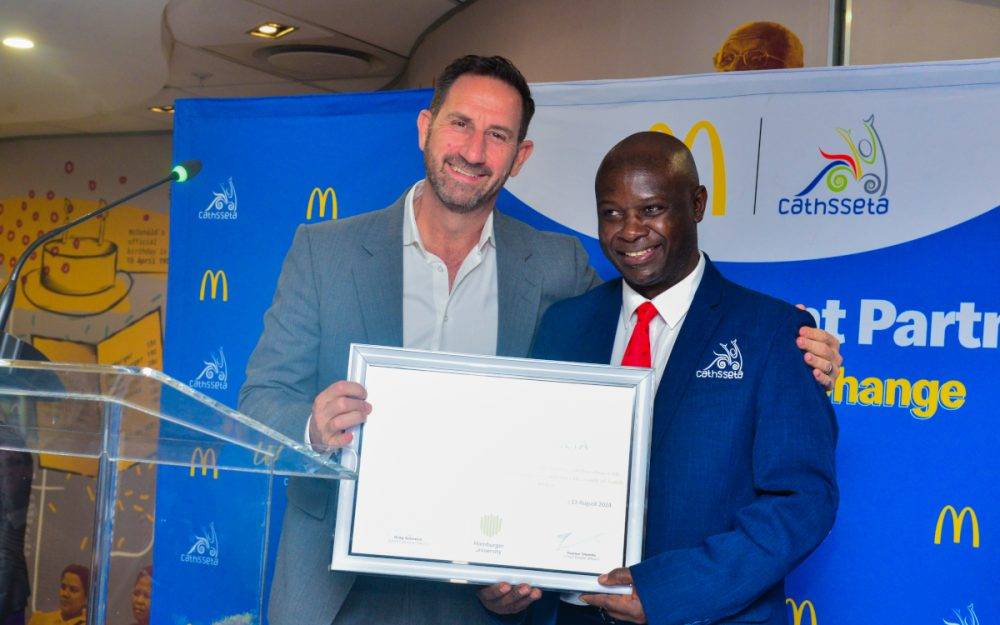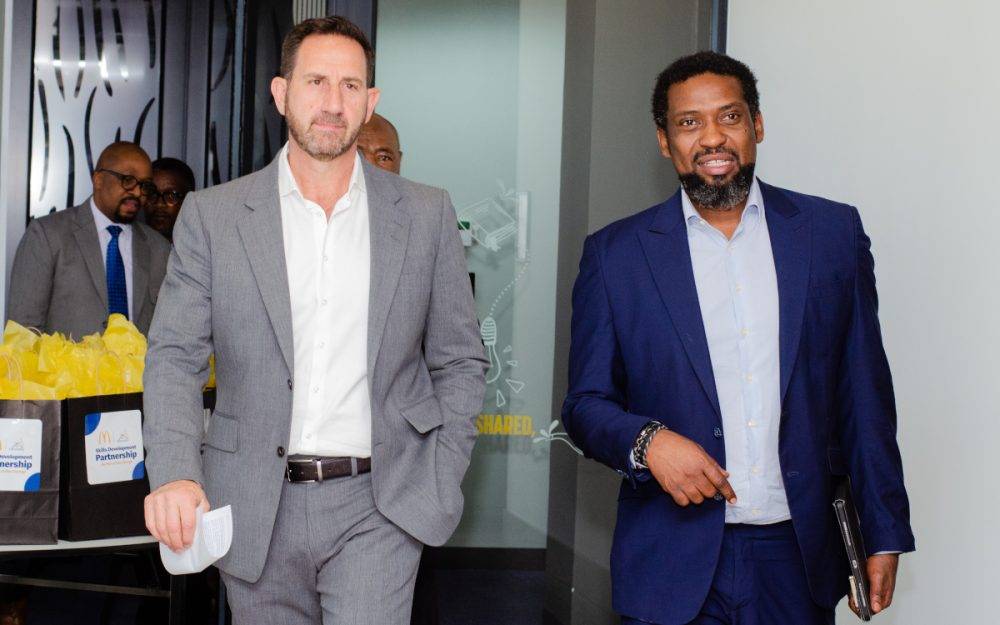
Greg Solomon, Chief Executive Officer at McDonald’s South Africa and Marks Thibela, Chief Executive Officer at CATHSSETA.
Continuous skills development is crucial to enable the youth to adapt to changing job markets and technological advancements
McDonald’s South Africa (MSA) is collaborating with the Culture, Arts, Tourism, Hospitality, and Sport Sector Education and Training Authority (CATHSSETA) to train 1 400 unemployed youths through a Hospitality Learnership Programme. This initiative aligns with CATHSSETA’s recently adopted High Impact Programme, which aims to empower unemployed individuals with skills that could lead to employment within McDonald’s and the broader hospitality sector. This initiative comes at a critical time, as continuous skills development is essential in countries with high youth unemployment rates.
CATHSSETA is one of the 21 Sector Education and Training Authorities (SETAs) established under the Skills Development Act (No. 97 of 1998) as amended. It was first established in 2001 as the Tourism and Hospitality Education and Training Authority (THETA), then re-established as CATHSSETA in 2012 to better reflect its broader mandate. Its mission is to facilitate skills development within its sub-sectors through grants for learning programs and the monitoring of education and training, as outlined in the National Skills Development Plan (NSDP), 2030.
CATHSSETA operates in the following sub-sectors:
• Arts, Culture, and Heritage
• Conservation
• Gaming and Lotteries
• Hospitality
• Sport, Recreation, and Fitness
• Tourism and Travel Services
Marks Thibela, Chief Executive Officer at CATHSSETA, says: “Our role and mandate, as set out in section 10 of the Skills Development Act, 1998, include developing and implementing a sector skills plan, which describes the trends in each sub-sector as well as the skills that are in demand. Additionally, this plan identifies priorities for skills development. We support and administer learning programs, facilitate the implementation of the National Qualifications Framework (NQF), and conduct quality assurance on learning in line with Quality Council for Trades and Occupations (QCTO) requirements.
 Greg Solomon, Chief Executive Officer at McDonald’s South Africa and Buti Manamela, Deputy Minister of Higher Education.
Greg Solomon, Chief Executive Officer at McDonald’s South Africa and Buti Manamela, Deputy Minister of Higher Education.“We also undertake quality assurance and disburse mandatory and discretionary grants using the collected levies to the qualifying stakeholders to implement skills development initiatives. Employers pay 1% of their payroll to the South African Revenue Service (SARS) monthly, of which CATHSSETA receives 80% for administration costs and grants, while the remaining 20% is paid to the National Skills Fund.”
Continuous skills development is crucial in addressing unemployment, as it equips individuals, especially the youth, with the knowledge and competencies needed to adapt to changing job markets and technological advancements. By enhancing their skills, workers and job seekers can improve their employability, thereby reducing the unemployment rate and contributing to the overall economic growth of the country.
McDonald’s role in this partnership includes:
• Recruitment: Driving mass awareness about the learnership to attract high-quality
candidates and sharing the positive narrative of the partnership.
• Engagement: Educating the public on participating in this initiative and providing regular stakeholder updates.
“Hospitality does not feature prominently in the top 10 learnerships that people talk about. The unemployment numbers among the youth are staggering, and as a responsible corporate citizen, we identified the need to bring CATHSSETA into the youth employment conversation. It was a meeting of minds, as their priority is skills development. Furthermore, we have partnered with Job Jack to ensure a seamless recruitment process, as they understand the technological preferences of Gen Z,” says Greg Solomon, Chief Executive Officer at McDonald’s South Africa.
McDonald’s is prepared to train more than the 1 400-youth promised to CATHSSETA. The overwhelming response to the programme highlights the urgent need for job creation in South Africa, as demonstrated by the 9 000 applicants, many of whom are graduates.
“The programme required that we partner with a reputable training partner, and for this reason, we collaborated with Training Force, which focuses on delivering industry- and job-specific skills assessments and training interventions to businesses,” continues Solomon.
The CATHSSETA & McDonald’s SA program offers blended training, combining classroom and on-the job training and assessment, with courses such as Occupational Health, Safety and Security, Business Communication, and Business Finance. From its recruitment efforts, McDonald’s has already enrolled 1 200 candidates in the learning program. This partnership is successful due to McDonald’s compliance with government legislation, particularly those related to skills development.
“To illustrate our commitment to skills development, McDonald’s established Hamburger University at our head office to offer our employees the best training available. Hamburger University is a global training centre dedicated to developing individuals’ skills and knowledge in restaurant operation procedures, focusing on quality, service, cleanliness and value. This empowers our teams to perform their tasks optimally and uphold our high standards,” says Solomon.
“This is one of the important interventions needed in South Africa. While the education system can do a lot, I believe the private sector also needs to play a significant role, which is why this initiative is crucial. It is not just about hosting learners who are graduates, it is about providing them with the experience that is essential for gaining employment — one of the biggest challenges facing our youth,” said Deputy Minister of Higher Education, Buti Manamela.
Manamela concluded by saying: “I challenge everyone, including the hospitality sector and other SETAs to contribute to helping the government create employment and provide young South Africans with access to skills that can lead to potential entrepreneurial opportunities. Skills development and training should not be the sole responsibility of the government. We must, and have been, working closely with the private sector to ensure that young people are equipped with the skills needed for sustainable employment.”
By investing in continuous skills development, McDonald’s and CATHSSETA are making a significant contribution to reducing youth unemployment and fostering a skilled workforce that can meet the demands of a dynamic economy.



 1 month ago
42
1 month ago
42









